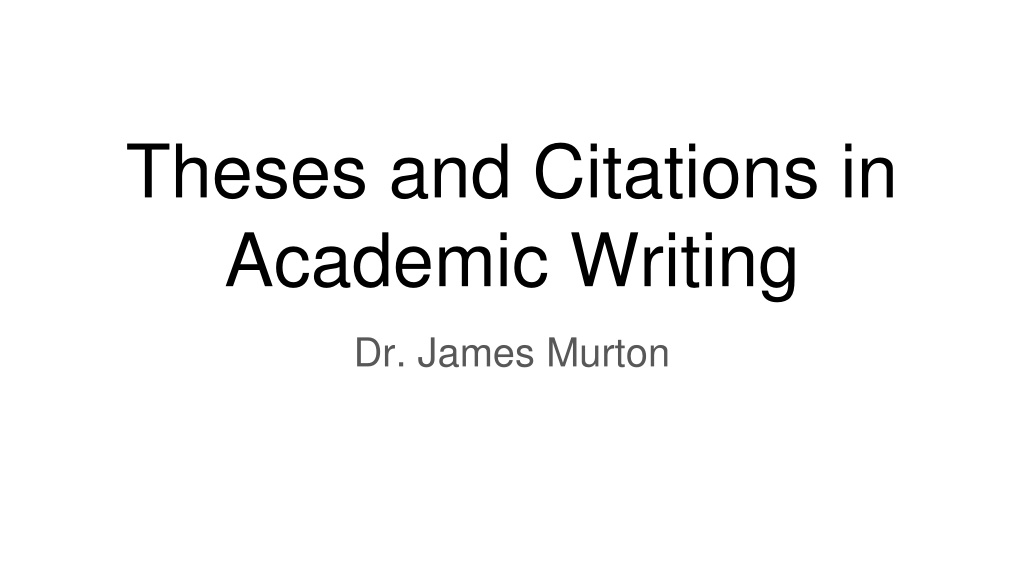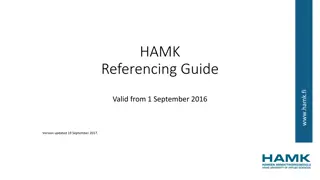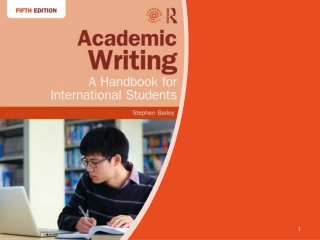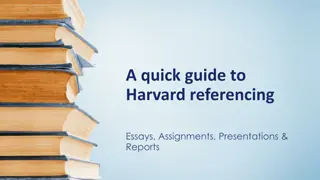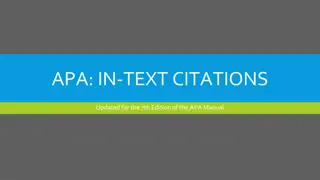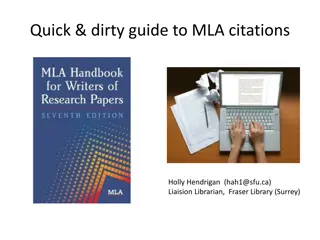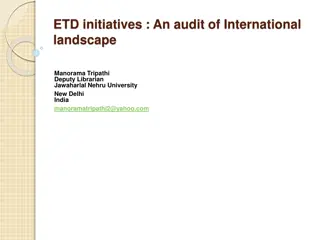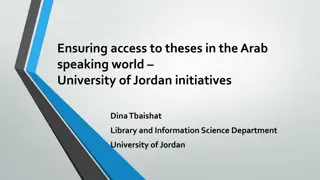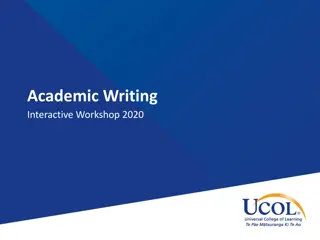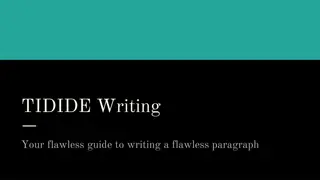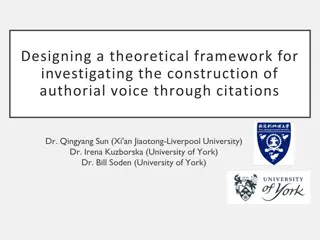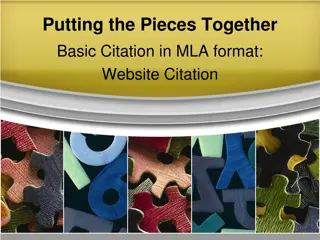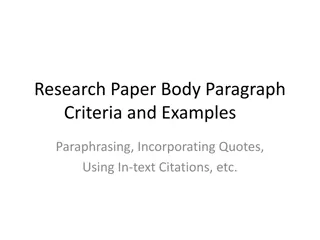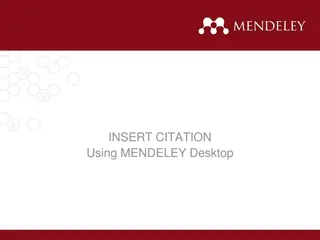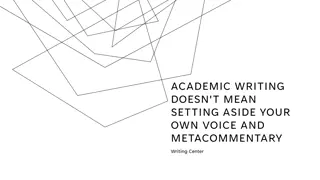Theses and Citations in Academic Writing by Dr. James Murton
In this resource, Dr. James Murton explores the elements of a thesis statement, providing examples to differentiate between statements, questions, facts, and opinions. The guide also includes illustrations on proper citations in Chicago style for books, academic journal articles, book sections, and web materials, enhancing academic writing proficiency.
Download Presentation

Please find below an Image/Link to download the presentation.
The content on the website is provided AS IS for your information and personal use only. It may not be sold, licensed, or shared on other websites without obtaining consent from the author. Download presentation by click this link. If you encounter any issues during the download, it is possible that the publisher has removed the file from their server.
E N D
Presentation Transcript
Theses and Citations in Academic Writing Dr. James Murton
Is this a thesis statement? This paper is about the role of nonviolent resistance in the Indian independence movement. Not a thesis (description) Why were Mohandas Gandhi s methods successful in the movement to achieve India s independence from Great Britain? Not a thesis (question) Mohandas Gandhi led the movement for India s independence from Britain Not a thesis (statement of fact) Mohandas Gandhi is my favourite political leader of the 20thcentury Not a thesis (statement of opinion) Thesis: Mohandas Gandhi s skillfull appeal to the court of public opinion doomed British rule in India. YES!! Answers the question: Why were Mohandas Gandhi s methods successful in the movement to achieve India s independence from Great Britain?
Citations in Chicago Style. Books. Book Footnote: Jonathan Vance, Death So Noble: Memory, Meaning and the First World War (Vancouver: UBC Press, 1997), 56. Vance, Death So Noble, 56. Bibliography entry: Vance, Jonathan. Death So Noble: Memory, Meaning and the First World War. Vancouver: UBC Press, 1997.
Citations in Chicago Style. Academic Journal Articles Footnote: Jon Lawrence, Forging a Peaceable Kingdom: War, Violence, and Fear of Brutalization in Post-First World War Britain, Journal of Modern History, 75 (2003): 571. Bibliography Entry: Lawrence, Jon. Forging a Peaceable Kingdom: War, Violence, and Fear of Brutalization in Post-First World War Britain. Journal of Modern History 75 (2003): 557-89.
Citations in Chicago Style. Book Section. Footnote: Peter Gatrell, Wars after the War: Conflicts, 1919, in John Horne, ed, Blackwell Companion to the First World War (Oxford: Oxford University Press, 2010): 562. Bibliography Entry: Gatrell, Peter. Wars after the War: Conflicts, 1919. In Blackwell Companion to the First World War, John Horne, ed. Oxford: Oxford University Press, 2010, 558-75.
Citations in Chicago Style. Material on the Web. Footnote: Ingrid Birker, The Passenger Pigeon, Redpath Museum, Sept 1, 2014, https://www.mcgill.ca/redpath/article/passenger-pigeon. Water Management, Indigenous and Northern Affairs Canada, last modified Nov 9, 2012, https://www.aadnc-aandc.gc.ca/eng/1100100037427/1100100037428. Bibliography: Birker, Ingrid. The Passenger Pigeon. Redpath Museum, Sept 1, 2014. https://www.mcgill.ca/redpath/article/passenger-pigeon. Indigenous and Northern Affairs Canada. Water Management. Last modified Nov 9, 2012. https://www.aadnc-aandc.gc.ca/eng/1100100037427/1100100037428.
When to cite a source The World War I novels of the late 20s and early 30s, such as Remarque s All Quiet on the Western Front, were more about the anxieties of the 1920s then about the war. Nevertheless, their view of the war as a futile bloodletting came to be widely accepted.1 1. Modris Eksteins, Memory and the Great War, in Hew Strachan, ed, The Oxford Illustrated History of the First World War (Oxford: Oxford University Press, 2014): 324-5. Eksteins, Modris. Memory and the Great War. In The Oxford Illustrated History of the First World War, Hew Strachan, ed. Oxford: Oxford University Press, 2014, 317-29.
Seminar Questions What foods were adulterated and why? How was the system set up so that the people selling the adulterated food did not know it was bad? What is necessary for good bread to be made? What do you think of Mrs. Van Winkle s list of things that need to be done so that bread can be good? Do these sound simple and easy to accomplish (think of the Victorian Baker)? How is the body like, and unlike, a steam engine? How did the respiration calorimeter work? Does anything about Atwater s way of talking about food surprise you? Why does Fannie Farmer give such explicit instructions? What do you think of Fletcherism? Why can people, according to De Voe, no longer identify good food? Do you think this is the real reason? What are some of the problems with the way people are selling food in the market according to De Voe? What has changed about the vegetables available in the market?
